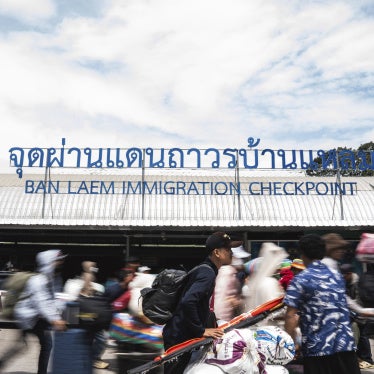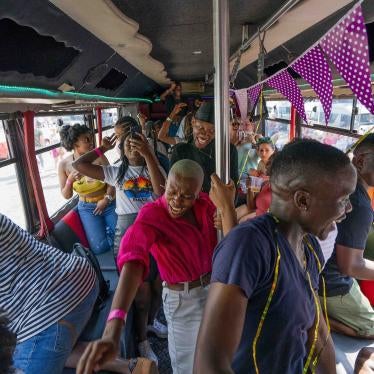When Abid was five, immigration officials arrested him and his family, Pakistani refugees fleeing religious persecution. The officials took them to the squalid immigration detention centre in central Bangkok. There, they joined hundreds of other refugees detained indefinitely, awaiting some distant possibility of release.
I spoke with Abid's uncle in 2013, while I was investigating the problems facing migrant children in Thailand. He told me how hard detention was for children: "My nephew asked, 'How long will I stay? Will I live the rest of my life here?' I didn't know what to say."
Thailand's immigration laws permit the indefinite detention of all refugees. Thousands of migrant children pass through immigration detention every year, including unaccompanied children — those travelling without their parents. Hundreds of refugee children are held for months or even years, unable to return to their home country. Even infants are locked up: guards take pregnant women to the hospital for delivery, and then return the mothers and their newborns to the same fetid cells a few days later.
The wretched conditions in Thailand's detention centres mean children are held in filthy, rat-infested cells without adequate nutrition, education or exercise space. Detainees consistently describe a bare and brutal existence for children inside the facilities, with cells so crowded children had to sleep sitting up.
Thailand's international commitments prohibit this sort of treatment: international law places strict limits on detention of children.
Thailand is a party to the Convention on the Rights of the Child, the world's most widely ratified human rights treaty, which celebrates its 25th anniversary today. Thailand should urgently change its immigration detention system before more children are harmed.
Detention can cause lasting damage to children's physical and mental health. Children have fewer psychological resources than adults to help them manage the stress, anxiety and poor conditions in indefinite detention. A considerable body of scientific literature describes the potential psychological harm, noting that children in particular can suffer from developmental delays, emotional disturbance, depression and post-traumatic stress disorder.
Children can't thrive in prolonged detention. In the course of my research I met a family of refugees with two children. Dara was an active six-year-old before he entered the immigration detention centre in Bangkok. But, his sister Devi told me, he quickly became despondent.
Dara's mother said: "It's hard on the children, we were all losing hope."
Devi was nine when she went into the detention centre, and was held for three years before she was released awaiting resettlement. "The worst part was that you were trapped and stuck," she said. "You look to the left, it was always the same. To the right, always the same … I would look outside and see people walking around the neighbourhood, and I would hope that would be me."
Thailand's abusive immigration detention practices are not unique. Worldwide, hundreds of thousands of children are detained every year. Many countries in the region routinely detain children, including Australia, Malaysia and Indonesia. Indonesia has hundreds of migrant and asylum-seeking children in detention facilities rife with violence. The most vulnerable aren't spared. In many countries, unaccompanied children and very young children are detained.
But Thailand is more than capable of treating refugee children far better. Alternatives to detention exist and are cheaper than detention. Open reception centres and conditional release programmes are used effectively in other countries. The Philippines operates a conditional release system through which refugee families are issued documentation and required to register periodically. Thailand has the capacity, through its Ministry of Social Development and Human Security, to operate such programmes.
In February 2013, the Committee on the Rights of the Child, which oversees the application of the Convention on the Rights of the Child, urged all governments to "expeditiously and completely cease the detention of children on the basis of their immigration status", concluding that such detention is never in the child's best interest.
Now, on the 25th anniversary of the convention, Thailand should enact legislation and policies that end the immigration detention of children. It should adopt alternatives to detention, including supervised release and open centres. Until children are no longer detained, the government should drastically improve conditions, including by providing access to adequate education and health care. Children like Abid, Dara and Devi shouldn't see their lives thrown away.








